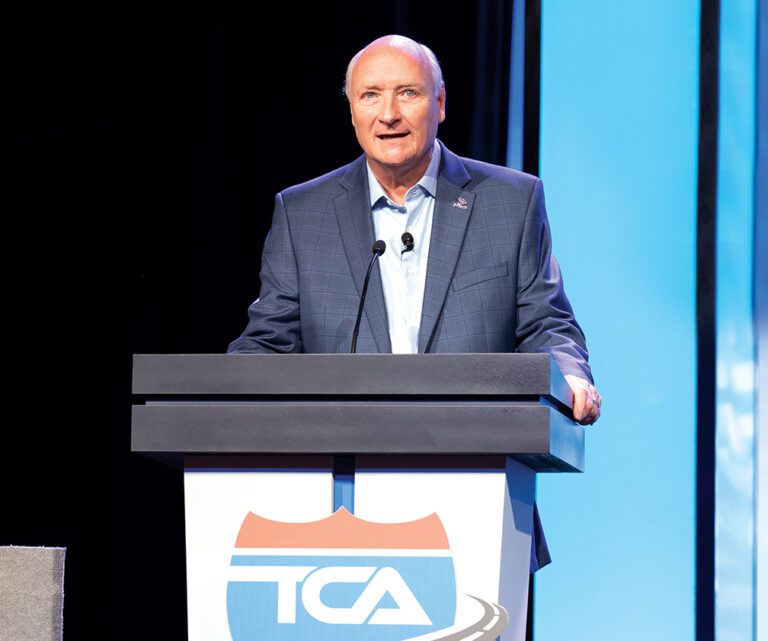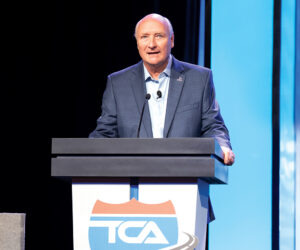In early 2022, Jim Ward stepped from the role of chairman of the Truckload Carriers Association (TCA) to the office of the association’s president. Ward recently sat down with Truckload Authority to talk about his background in trucking, his first nine months in his new role, and what’s ahead for TCA in 2023.
Question: Mr. President, a couple of background questions, please. What event or events in your life were influential in your decision to pursue a career in trucking?
Answer: I grew up in the small town of Hancock in Western Maryland, which was best known for its fruit production. The community bordered the Chesapeake and Ohio Canal (C&O), and as the National Pike extended westward, the main street became known as the Bank Road or “Baltimore Street.” I can remember, as a young man, leaving my grandfather’s barber shop to walk home on Friday nights — and it was difficult for us to cross the main street because of all the traffic. The Western Maryland Railway (WMR) ran alongside the C&O canal on the south side of the community, following the Potomac River. I was always in awe of that powerful piece of iron that was moving goods. So, to obtain a job with the WMR in 1978, and ultimately become a locomotive engineer, was like living a dream to me.
Question: What has been your career path, i.e., carriers for which you have worked, positions held, and approximate dates when you held those positions?
Answer: My trucking career was with the family-owned carrier D. M. Bowman, Inc., located in Williamsport, Maryland. Don Bowman allowed me to learn the business from the ground up, starting in January 1985 as safety supervisor, then in 1988 as director of human resources, and in 1991 as vice president of quality. In 1993, I departed the company and assumed the role of eastern division director for Willis Corroon’s Transportation Industry Division, and in 1997, I was named the managing director. In 1999, I returned to D.M. Bowman as CEO; in 2001 was named president and CEO, a role I fulfilled until my retirement in 2022.
Question: What led you to become an officer at TCA?
Answer: Mr. Bowman encouraged involvement in industry associations. He was active and progressed through the chair positions in the Maryland Motor Truck Association and the American Trucking Associations. He provided the moral and financial support for me to be involved. I learned a lot from my peers in the industry over the years, and I continue learning today.
Question: John Lyboldt announced in April 2021 that he would retire April 1, 2022. You immediately appointed a team, which launched a nationwide search for a new president. That search generated numerous qualified applicants. When members of the search team approached you about becoming president, what was your reaction?
Answer: I was honored they would consider me as a prospective candidate. It honestly was not something I had given a minute’s thought about. As an officers group, we had an obligation to the membership to find the best possible candidate for the job. We assembled a very well-respected committee and hired an industry expert to lead the search. As chairman at the time, I had total confidence in the process and knew the future of TCA was in good hands. I am truly honored and blessed to be in the leadership role at TCA representing so many hardworking companies, accompanied by a staff that desires to grow and see our members delight in our value proposition!
Question: Tell us a little about the thought process that led you to decide to accept the offer and become TCA’s president.
Answer: My first discussion was with my wife, Starla, followed by a conversation with Don Bowman. Both provided their encouragement. I have been very blessed with good health, I love a challenge, and most of all, I find it very rewarding to work alongside industry leaders in North America who are passionate about being a good neighbor on our nation’s highways, improving the driving job, educating legislators about our business, and improving profitability.
Question: Effective April 1, 2022, you became TCA president. Did you view your new job as an opportunity or a challenge (or both)? What were those challenges and/or opportunities?
Answer: Both. As with any new role, you first want to understand the customers’ or members’ needs, grasp how those needs are currently being met, and then identify what opportunities there are to improve upon your service offering.
Question: You had been involved in TCA for a long time, including the past eight years as an officer and finally chairman — which leads us to believe there were no surprises when you gave up the gavel for the new office. Is that correct?
Answer: It’s always different when you’re inside the walls versus looking in from the outside; however, there were no big surprises. I spent the first 90 days getting to know the staff, talking to members and past chairmen, and familiarizing myself with internal processes and procedures.
Question: This may seem like a simple question — but then again, maybe not. In today’s business environment, what is the importance of a trade association, and how is the TCA meeting the obligations of a trade association?
Answer: We provide educational and certification offerings in all aspects of the trucking business, such as safety and risk management, fleet management, technician supervisory training, driver training and development, and benchmarking. In addition, we serve as the ‘voice of truckload’ with the nation’s legislators. All of these are our strengths and are key to our member value proposition. TCA’s Truckload Academy and North American Transportation Management Institute provide the educational offerings in current demand from our members, and we continue to expand these offerings.
Question: You’ve been in office now for about nine months. Looking back over that time, what have been your most valuable accomplishments?
Answer: We, the staff, officers, and member sponsors, have completed a thorough review of the TCA Driver of the Year Program, resulting in a much-improved driver recognition award. Our TCA Profitability Program is in transition to store member’s data, and produce the groups composite inside TCA. We returned to basics for our Refrigerated Meeting and focused the sessions and speakers solely on the refrigerated business. Finally, we held our first TCA Past Chairmans event, hosted by Robert Low, at the Palace in Biloxi, Mississippi.
Question: Two of your most visible achievements at TCA have been changes to structure of the annual convention and the Professional Drivers of the Year contest. What was the reasoning behind those enhancements?
Answer: TCA is determined to deliver the highest-quality educational sessions and industry information available through our industry experts and for C-suite level attendees at our annual meeting. We can all learn from each other, and so we are seeking out those individuals to share their experiences, thoughts, and ideas with members on how best to prepare to navigate the road ahead. Our members input during our policy committee meetings provide us with the necessary guidance and direction to help us align our limited resources to better serve them. Because of this, we have scheduled the meetings so everyone can attend and provide their insight.
We are not advocating that everyone gets an award, but the committee that led the changes to the TCA Professional Drivers of the Year Awards Program wanted to move away from awarding just one first-place winner to recognizing five professional drivers as TCA’s Class of 2023 — all winners, with something substantial as a prize, like a check for $20,000 each. We hope everyone will plan to join us in Orlando in March for this year’s event!
Question: Are you reviewing the status of other TCA programs and services?
Answer: We have and will continue to do so. TCA is always looking to improve its offerings and awards.
Question: Member education is growing by leaps and bounds. What is the strategy behind TCA’s educational programs?
Answer: Listen to your members and provide information on the topics they are interested in.
Question: Looking to 2023, which will be your first full calendar year as president, what are the three most critical issues the industry must address? Why are those issues critical, and how must the industry address them?
Answer: Workforce challenges have been — and will continue to be — at the forefront of every discussion, so seeking ways to bring new entrants into the industry in the future will be an ongoing opportunity. It is obvious that transitioning away from the internal combustion engine as we know it today, is going to continue to be a priority inside the beltway. We will need to keep an open mind, remain engaged, and make sure that, as the industry transitions to future technology, the time lines for implementation are reasonable and attainable. Finally, maintaining the image, the essentiality of trucking, we have come to enjoy during and following the COVID-19 pandemic will take all of us working together to make sure it doesn’t fade away.
Question: In closing, you’ve been intimately involved in the trucking industry for a long period of time. How is the industry different than it was 10 years ago and what’s ahead in the years to come?
Answer: Technology has changed the industry immensely over the past 10 years and will continue to do so. It has provided quality data to the industry to use in decision-making and has removed a lot of unnecessary emotion out of the day-to-day between all parties — carrier, shipper, and driver relationship. I believe Moore’s Law, which posited technology will double in improvement roughly every 24 months, is a principle that is alive and well in our industry today.
This article originally appeared in the January/February 2023 edition of Truckload Authority, the official publication of the Truckload Carriers Association.
Lyndon Finney’s publishing career spans over 55 years beginning with a reporter position with the Southwest Times Record in Fort Smith, Arkansas, in 1965. Since then he’s been a newspaper editor at the Southwest Times Record, served five years as assistant managing editor of the Arkansas Democrat-Gazette in Little Rock and from November 2004 through December 2019 served as editor of The Trucker. Between newspaper jobs he spent 14 years as director of communications at Baptist Health, Arkansas’ largest healthcare system. In addition to his publishing career he served for 46 years as organist at Little Rock’s largest Baptist church.











